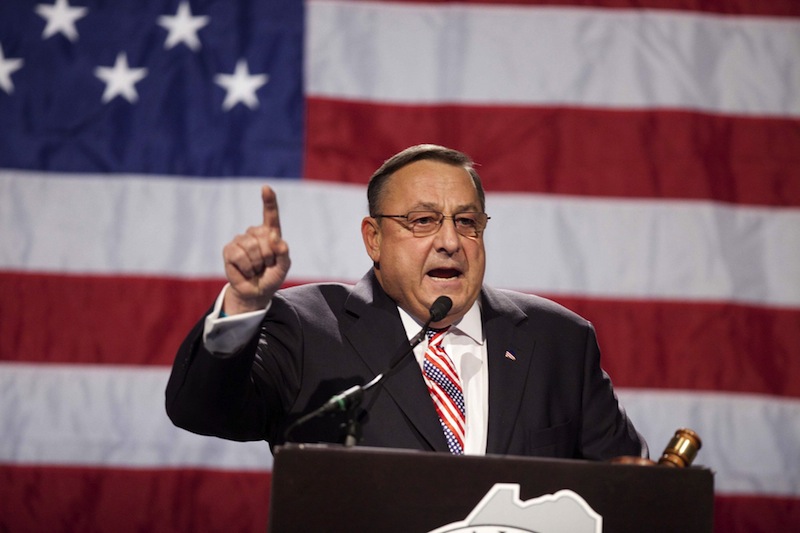AUGUSTA – The lawyer seeking an investigation into claims that Gov. Paul LePage pressured unemployment hearing officers to side with business owners over workers said Friday that the allegations are “just the tip of the iceberg.”
David Webbert, president of the Maine Employment Lawyers Association, also said that a March 21 lunch meeting between LePage and the officers could be grounds to reopen recent appeals decisions.
“People who have been denied benefits since the governor took office now have good reason to have their cases reviewed,” Webbert said Friday. The association includes about 50 lawyers who represent workers in unemployment benefits cases.
Webbert said he’s still gathering information for a request to Attorney General Janet Mills to investigate claims from the unidentified hearing officers that LePage berated them at the meeting, which took place at the Blaine House. Webbert said he interviewed several of the officers, who claimed that LePage boasted of engaging in a “similar dressing down of other more formal judicial officers.”
The LePage administration has disputed the allegation that LePage pressured the officers, saying the meeting was designed to discuss systemic flaws and inconsistencies in unemployment appeal hearings.
Adrienne Bennett, LePage’s spokeswoman, declined to comment on Webbert’s statements Friday. LePage “is not going to go back and forth in the media with a lawyer with no firsthand knowledge of the event,” Bennett said.
“These new allegations are yet another distraction from the real issue,” she said in a statement. “It is critical for both employees and employers that they have faith in the process and their cases are decided based on the rule of law.”
Webbert said he plans to ask the inspector general within the U.S. Department of Labor to determine if the LePage administration obstructed or tried to influence hearing officers’ adjudicatory proceedings, which are governed by federal and state guidelines.
The hearing officers are state employees in federally funded positions. The unemployment hearings and the distribution of benefits is overseen and audited by the U.S. Department of Labor.
Tim Belcher, legal counsel for the Maine State Employees Association, the union representing state workers, said Friday that the organization continues to review facts in the case to determine whether it will request an investigation or pursue legal action.
Belcher also hinted at pursuing a federal inquiry, adding that workers who have lost their jobs may worry that they may not be getting benefits they are entitled to under law.
The officers who met with LePage preside over hearings on whether employees should receive an unemployment benefit that averages $281 per week. For businesses, the outcomes affect rates they pay into an unemployment trust that funds the unemployment benefit program. The more unemployment claims or appeal rulings against an employer, the higher the payments to the fund.
The system is often criticized by employers and business groups, who argue that it’s too easy for fired employees to receive benefits. The LePage administration has said the governor’s interest in reforming the hearing process stems from complaints from businesses and his own experience when he was the manager of Marden’s Surplus & Salvage.
Attorneys who represent employees counter that the system is intentionally designed to balance an employer’s ability to fire anyone without cause.
“It’s supposed to be easy to get unemployment benefits unless you engage in willful misconduct,” Webbert said.
At the center of the dispute between LePage and the hearing officers are the outcomes of misconduct appeals hearings. Maine Department of Labor records for workers who were fired for misconduct show that the results of unemployment claims appeals hearings fluctuate from year to year.
In 2008, 39 percent of misconduct appeals decisions favored the employer. The number fell to 37 percent in 2009, climbed to 43 percent in 2010, dropped to 34 percent in 2011 — LePage’s first year in office — and then rose to 40 percent in 2012.
Julie Rabinowitz, a spokeswoman with the Maine Department of Labor, said the cost of going to a hearing sometimes prompts businesses to absorb a claim. But when claims spike — as they do during a weak economy — businesses are more inclined to contest claims to keep down the rates they pay into the unemployment trust fund.
The LePage administration argues that the claims hearings are inconsistent and that officers, most of whom are lawyers, are ignoring evidence that could sway outcomes.
Webbert said that regardless of what LePage said to hearing officers, the Blaine House meeting itself represented an attempt to exert political pressure on the process.
“They were all waiting around (the Blaine House) lined up for execution,” he said. “It was like being called up to the dictator’s office. It was like something in North Korea.”
Webbert also questioned the administration’s claim that the meeting was designed to promote fair outcomes for employers and employees. He cited comments from hearing officers that they had been told by their supervisors in 2011 to turn over for review all decisions favorable to employees, but not those favorable to employers.
“That’s the intimidation,” Webbert said. “The governor is watching you when you rule for the claimant; the governor is not watching you when you rule for the business.”
The LePage administration said no such policy was implemented.
Steve Mistler can be contacted at 620-7016 or at:
smistler@pressherald.com
On Twitter: @stevemistler
Send questions/comments to the editors.



Comments are no longer available on this story